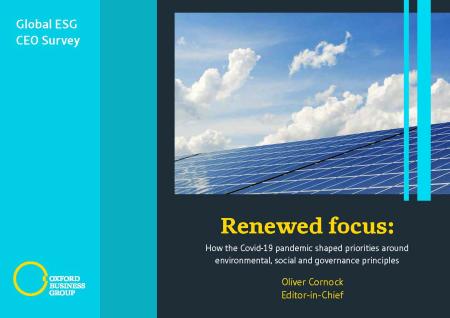A survey carried out by global research and advisory company Oxford Business Group (OBG) assesses the observations of international C-suite executives on a broad range of issues related to environmental, social and governance (ESG) principles, including the impact of the Covid-19 pandemic on their decision-making
Titled “Renewed focus: How the Covid-19 pandemic shaped priorities around ESG principles”, this marks the first time the landmark survey has focused on ESG. Results comprise more than 350 respondents from across the regions covered by OBG, with questions concerning their current approach to ESG and incumbent challenges to growth.
The results of the survey can be viewed in full at https://oxfordbusinessgroup.com/blog/oliver-cornock/obg-ceo-surveys/esg-ceo-survey-board-room-getting-greener
In its research, OBG surveyed executives based across the economic sectors, with financial services and energy highest in terms of representation.
The findings are supported by in-depth analysis from OBG’s Editor-in-Chief Oliver Cornock and the firm’s four Regional Editors, who explore the specific characteristics of the markets they cover and track their ESG journeys.
Significantly, more than 60% of global respondents said the pandemic had moderately or significantly impacted their understanding and/or appetite for ESG, in a sign that the health crisis had spotlighted vulnerabilities in supply chains and other areas, and encouraged companies to put sustainability at the heart of new strategies.
In his contribution, Patrick Cooke, OBG’s Regional Editor for the Middle East, said that the governments of all six Gulf Cooperation Council members have, to varying degrees, formulated their long-term strategies to diversify their economies, reduce public subsidies and stimulate the creation of productive and attractive job opportunities in the private sector.
“It is positive to note that these strategies have increasingly placed an emphasis on environmental sustainability, social progress and good governance as they have evolved over time,” he said. “I expect to see further acceleration of corporate ESG adoption in the region over the next few years as a result of public incentives, new regulatory requirements and the growing importance that international investors place on ESG adherence.”
In a question about obstacles to ESG adherence, respondents cited insufficient financing and incentives or penalties for non-compliance, was cited as the biggest challenge faced by companies, garnering 20.4% of the response.
OBG also asked executives about their priorities for environmental sustainability over the next 12 months. Here, sustainable investment took the top spot, cited by 22% of interviewees, followed by renewable energy (19%).
In a sign of the increased broad-based focus on ESG, more than one-third (35%) of those interviewed said they expected their company to prioritise funding for all-three pillars, although governance was mentioned least often as an individual area.
Oliver Cornock, OBG’s Editor-in-Chief, said that while the Covid-19 pandemic could have resulted in the adoption of ESG principles being sidelined, the opposite had in fact happened, as the survey showed.
“Shareholders and investors are now factoring ESG strategy and trajectory into their decision-making, and consumers are similarly becoming more aware of the fairness and sustainability of the goods they use, the clothes they wear and the services they pay for,” he said. “This is equally true for foreign investors who are looking at the ESG environment, regulations and incentives of the countries in which they are considering doing business.”
Cornock said OBG’s survey also reaffirmed that while the battle for environmental sustainability was being won on many levels, the relatively low showing for governance represented a challenge for some of the emerging markets looking to attract foreign investment.
“The tacit acceptance that corruption is simply a part of doing business in some places is one of the most significant barriers to advancing the governance segment,” he noted. “Progress in the environmental sustainability and social spheres cannot reach its full potential until the correct governance structures are in place and effectively enforced.”
Cornock’s viewpoint can be found in full on OBG’s Editor’s Blog, alongside additional analysis by all of OBG’s Regional Editors on the markets that they cover. Titled “Next Frontier”, the blog serves as a platform for OBG’s experts to share their thoughts on the latest developments taking place across the sectors of the 30+ high-growth markets covered by the company’s research.
OBG began producing its CEO Surveys in 2016 as a way of giving licence-holders a handle on business sentiment in the economies it covers, termed the Yellow Slice markets, in reference to its corporate colour. Since then, they have become a highly popular and integral part of the firm’s portfolio of research tools.
The OBG CEO Surveys form part of the Group’s tailored studies that the company is currently producing, alongside other highly relevant, go-to research tools, including a range of country-specific Growth and Recovery Outlook articles and interviews. The full results of the surveys are available online and in print. Similar studies are also under way in the many markets in which OBG operates.

